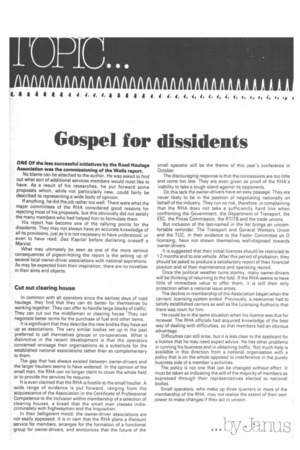Gospel for dissidents
Page 66

If you've noticed an error in this article please click here to report it so we can fix it.
ONE OF the less successful initiatives by the Road Haulage Association was the commissioning of the Wells report. No blame can be attached to the author. He was asked to find out what sort of additional services members would most like to have. As a result of his researches, he put forward some proposals which, while not particularly new, could fairly be described as representing a wide body of opinion. If anything, he did the job rather too well. There were what the major committees of the RHA considered good reasons for rejecting most of his proposals, but this obviously did not satisfy the many members who had helped him to formulate them.
His report has become one of the rallying points for the dissidents. They may not always have an accurate knowledge of all its provisions, just as it is not necessary to have understood, or even to have read, Dos Kapital before declaring oneself a Marxist.
What may ultimately be seen as one of the more serious consequences of pigeon-holing the report is the setting up of several local owner-driver associations with national aspirations. As may be expected from their inspiration, there are no novelties in their aims and objects.
Cut out clearing house
In common with all operators since the earliest days of road haulage, they find that they can do better for themselves by working together. They can offer to handle large blocks of traffic. They can cut out the middleman or clearing house:They can negotiate better terms for the purchase of fuel and other items.
It is significant that they describe the new bodies they have set up as associations. The very similar bodies set up in the past preferred to call themselves groups or co-operatives. What is distinctive in the recent development is that the operators concerned envisage their organisations as a substitute for the established national associations rather than as complementary to them.
The gap that has always existed between owner-drivers and the larger hauliers seems to have widened. In the opinion of the small man, the RHA can no longer claim to cover the whole field or to provide the services he requires.
It is even claimed that the RHA is hostile to the small haulier. A wide range of evidence is put forward, ranging from the acquiescence of the Association in the Certificate of Professional Competence to the inclusion within membership of a selection of clearing houses, a breed that the small man classes indiscriminately with highwaymen and the Inquisition.
In their belligerent mood, the owner-driver associations are not easily appeased. It is in vain that the RHA plans a discount service for members, arranges for the formation of a functional group for owner-drivers, and announces that the future of the small operator will be the theme of this year's conference in October.
The discouraging response is that the concessions are too little and come too late. They are even given as proof of the RNA's inability to take a tough stand against its opponents. On this tack the owner-drivers have an easy passage. They are never likely to be in the position of negotiating nationally on behalf of the industry. They run no risk, therefore, in complaining that the RHA does not take a sufficiently hard line when. confronting the Government, the Department of Transport, the EEC, the Prices Commission, the RTITB and the trade unions.
But inclusion of the last-named in the list brings an uncomfortable reminder. The Transport and General Workers Union and the TUC, in their evidence to the Foster Committee on 0 licensing, have not shown themselves well-disposed towards owner-drivers.
It is suggested that their initial licences should be restricted to 1 2 months and to one vehicle. After this period of probation, they should be asked to produce a satisfactory report of their financial position and of their maintenance and 'operating record.
Once the political weather turns stormy, many owner-drivers will be thinking of returning to the fold. If the RHA seems to have little of immediate value to offer them, it is still their only protection when a national issue arises.
The decline in membership of the Association began when the carriers' licensing system ended. Previously, a newcomer had to satisfy established carriers as well as the Licensing Authority that there was room for him.
He could be in the same situation when his licence was due for renewal. The RHA officials had acquired knowledge of the best way of dealing with difficulties, so that members had an obvious advantage.
Difficulties can still arise, but it is less clear to the applicant for a licence that he may need expert advice. He has other problems in running his business and in obtaining traffic. Not much help is available in this direction from a national organisation with a policy that is on the whole opposed to interference in the purely business side of a member's activities.
The policy is not one that can be changed without effort. It must be taken as indicating the will of the majority of members as expressed through their representatives elected to national bodies.
Small operators, who make up three quarters or more of the membership of the RHA, may not realise the extent of their own power to make changes if they act in unison.
. by ,P S








































































































































